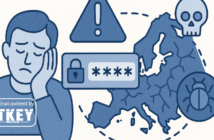The post was originally published in Russian on Startup of the Day. Alexander kindly agreed to republish what we think is of great value to our readers.
Colleges help their alumni find nice jobs. Aside from the moral and ethical side of the issue, the school also has a material gain. The more its former students land good jobs, the higher the university is in the ratings, the more testimonials it gets, – as a result, it all leads to an increased number and quality of its future applicants. Many American colleges set up specialized career help centers. The employers publish intern openings, students respond, everything the same as on any jobseeking website.
Handshake, the startup of the day, is essentially a unified center for all schools in the USA at once. It made a deal with colleges that they upload the info on the students’ grades, and then everything goes the same as it used to: openings, responses, filters by grades. The employer applies the same effort and gets access to a 100x bigger database of candidates, and the student sees 100x more openings. Chances of a successful meeting increase – of course, not as much, but they do increase.
Compared to LinkedIn or other similar jobseeking methods, Handshake gives the employer more confidence in the candidate – they are definitely not lying, and the profile gets uploaded automatically by the college. The same transparency helps the student, they cannot lie, but their words also don’t get doubted. The startup earns off companies. So far, it charges only for auxiliary services, highlighting their openings in the list, etc., but later on, it will probably charge for the basic service as well.
As of now, Handshake mentions 700 colleges, 300 thousand employers, and 14 million students. The first figure is credible (there are four thousand in the USA altogether), but the other two seem like an exaggeration. It’s probably not an outright lie from the side of the startup, but it can include, for example, all the signups as opposed to active users per month as it is by default.
In its recent investment round, the company brought in USD 40M at the valuation of USD 275M.
—
This is a rerun from 2018. The startup is doing very well, and after its January round, it’s valued at USD 3.5B already. There’s really not much to add to this simple figure.
Translation: Kostiantyn Tupikov

Alexander made his career in Russian internet companies including Mail.Ru, Rambler, RBC. From 2016 to 2018 he was Chief Strategy and Analytics officer in Mail.Ru Group. In this position, he worked on M&A, investments, and new project launches. In 2018 he became Deputy CEO in Citymobil, a Russian Uber-like company that was invested by Mail.Ru Group and Sberbank (the biggest Russian bank), then he left the company to launch his own projects. Now Alexander is a co-founder of United Investors – the platform for co-investments in Russian early-stage startups. His blog #startupoftheday (#стартапдня) is one of the most popular blogs about startups in Russia.





